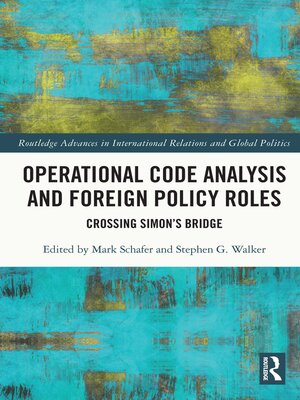Operational Code Analysis and Foreign Policy Roles
ebook ∣ Crossing Simon's Bridge · Routledge Advances in International Relations and Global Politics
By Mark Schafer

Sign up to save your library
With an OverDrive account, you can save your favorite libraries for at-a-glance information about availability. Find out more about OverDrive accounts.
Find this title in Libby, the library reading app by OverDrive.



Search for a digital library with this title
Title found at these libraries:
| Library Name | Distance |
|---|---|
| Loading... |
In this book, senior scholars and a new generation of analysts present different applications of recent advances linking beliefs and decision-making, in the area of foreign policy analysis with strategic interactions in world politics.
Divided into five parts, Part 1 identifies how the beliefs in the cognitive operational codes of individual leaders explain the political decisions of states. In Part 2, five chapters illustrate progress in comparing the operational codes of individual leaders, including Vladimir Putin of Russia, three US presidents, Bolivian president Evo Morales, Sri Lanka's President Chandrika Kumaratunga, and various leaders of terrorist organizations operating in the Middle East and North Africa. Part 3 introduces a new Psychological Characteristics of Leaders (PsyCL) data set containing the operational codes of US presidents from the early 1800s to the present. In Part 4, the focus is on strategic interactions among dyads and evolutionary patterns among states in different regional and world systems. Part 5 revisits whether the contents of the preceding chapters support the claims about the links between beliefs and foreign policy roles in world politics.
Richly illustrated and with comprehensive analysis Operational Code Analysis and Foreign Policy Roles will be of interest to specialists in foreign policy analysis, international relations theorists, graduate students, and national security analysts in the policy-making and intelligence communities.







